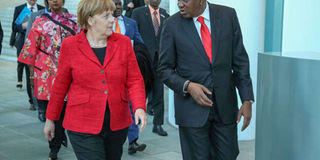Purveyors of fake news are on a roll; how do we stop them?

German Chancellor Angela Merkel with President Uhuru Kenyatta in Berlin during the latter's visit to Europe. Purveyors of fake news later said Merkel made a speech, saying Mr Kenyatta was the best leader in Africa.
What you need to know:
- While journalists cannot take refuge in anonymity, propagators of fake news are not constrained by libel laws.
- Kenyans no longer know who or what to believe. That is patently true.
one extent or the other, all of us have been victims of the relatively new phenomenon variously known as “fake news”, “alternative facts” or “alternative truth”.
The problem is not that these varieties exist, but that we too often lap up them up without a second thought because it mainly conforms to our pet prejudices.
We thrive on propaganda when it suits our purposes but seethe with indignation when other views run counter to our beliefs.
VOLATILE
Incidentally, this is not just about us Kenyans; it is a worldwide problem which defies quick fixes.
But fake news is not really a new concept. Throughout history, human beings have always used propaganda as a tool to sway people’s opinions on volatile issues.
Today, it is only the terminology that is different. Indeed, this aberration has a rich history.
From Roman emperors to British monarchs, from America’s founding fathers to popes and other religious types, propaganda based on lies and half-truths has always served as a weapon to neutralise challengers.
Terrible wars have been fought based on nothing else.
For instance, during the first and second world wars, propaganda on either side was as lethal a weapon as bombs.
The Holocaust was based on false accounts of how Jews were killing Caucasian babies and using their blood in rituals.
MISINFORMATION
Closer home, the 2007/2008 post-election violence may have been based on perceived stolen elections, but it took a different trajectory when vernacular radio stations broadcast lies that took a life of their own.
Fake news is loosely defined as a type of journalism that consists of deliberate misinformation to damage the reputation of a person or entity with the aim of gaining financially or politically.
Its major difference with traditional journalism is that it relies heavily on sensationalism, half-truths or outright lies, while the traditional variety is, or should be, pegged on objectivity.
ANONYMITY
Another difference is that while real journalists cannot take refuge in anonymity, propagators of fake journalism are not constrained by the laws of libel.
It has not always been so, but with the increasing use of social media, those folks who do not read newspapers or even watch television resort to its platforms for their news and they believe what they read, sometimes not even bothering to go beyond the headlines.
The problem is that since they do not seek the truth, such people allow the purveyors of fake news to do their thinking for them.
G20 SUMMIT
An example of how destructive planted news can be was seen during last year’s presidential election campaign.
As the tempo picked up, we got to learn how perverse this practice can be.
Early last year, President Uhuru Kenyatta visited Germany for the G20 summit in Hamburg, a very rare honour.
Afterwards, German Chancellor Angela Merkel apparently made a lengthy speech praising the President as the best leader from Africa she has ever talked with, and all manner of things.
FULSOME PRAISE
She may have done so all right, but the way the news was presented was very suspicious.
There was no context, no mention of why Chancellor Merkel had not said those nice things to President Kenyatta in Germany (he had long come back home), no mention of where the fulsome praise was published and therefore no way of verifying the truth.
Since this was one of those posts circulating in WhatsApp, I paid little attention.
TRUMP CALLS
But I was to remember it when a short time later I chanced upon another in which President Trump, in a telephone call, all but endorsed Mr Kenyatta for the presidency.
A week later, it was Mr Raila Odinga’s turn to receive a similar call from Trump, also circulated in WhatsApp.
I had to ask myself: doesn’t Mr Trump have other things to do with his time?
I was forced to tell the chap who was disseminating that rubbish to cease and desist.
TENSION
The point I’m making is that it is difficult, if not impossible, to deal with the menace which can become deadly during periods of tension, especially before or after elections.
But reportedly, help is on the way.
TRUTH
On Tuesday, US ambassador Robert Godec launched a campaign against fake news, saying that Kenyans were losing faith in news media due to the pervasive nature of fake news.
In short, they no longer know who or what to believe. That is patently true.
The first victim of fake news is always the truth.
Magesha is a consultant editor. [email protected]





